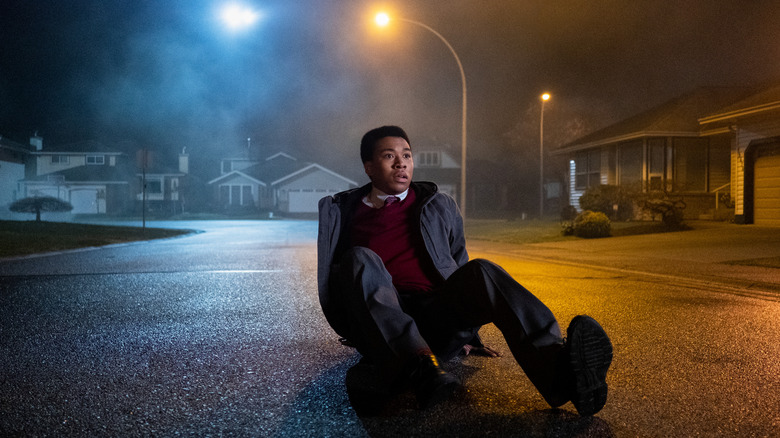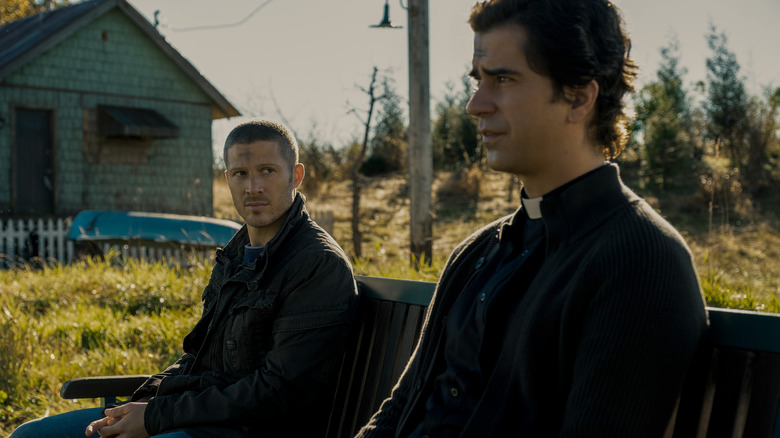The Big Difference Between Midnight Mass And The Midnight Club, According To Mike Flanagan
Writer/director Mike Flanagan has firmly established himself as Netflix's king of thoughtful, slow-burn horror. The relationship began with Flanagan's 2016 movie "Before I Wake," and continued with his 2017 adaptation of the Stephen King novel "Gerald's Game." But things really kicked off in 2018 with the arrival of "The Haunting of Hill House," a series that was (very) loosely based on the Shirley Jackson book of the same name. This was followed by "The Haunting of Bly Manor," and Flanagan has another house-themed horror adaptation coming soon: "The Fall of the House of Usher."
But first up is "The Midnight Club," a series aimed at slightly younger audiences. It's based on the book of the same name by Christopher Pike, the author responsible for a large collection of gripping horror novels aimed at young adults. If you spent your pre-teen years reading "Goosebumps" books, there's a good chance you graduated to Christopher Pike novels when you were ready for something a little more mature.
Pike's faith in teenagers' ability to handle dark subject matter is being carried over to the Netflix adaptation of "The Midnight Club." Like the book, the show is about a group of terminally ill teens living in a hospice, who sneak out of their rooms at night to meet up and share scary stories. As Flanagan explained to Empire:
"One of the big things we assumed was that the younger viewers could handle scares ... [Pike's] work was hugely formative for me. He wrote some pretty advanced stuff for his younger readers, and it was not at all uncommon for his teenage characters to die, pretty shockingly. His books were full of things I found really exciting and thrilling and dark. So I became a bit of an addict."
Dealings with death
After "The Haunting of Bly Manor," Mike Flanagan took a break from hauntings to write and direct the horror miniseries "Midnight Mass," a show that has more in common with "The Midnight Club" than just having the word "midnight" in the title.
Like the "Midnight Club" characters, who are facing death at a cruelly young age, "Midnight Mass" also explored death and how we deal with our fear of it. In one of the series' most heart-wrenching scenes, a character who knows their own death is imminent delivers an eight-minute monologue on what they believe will happen to them when they die. Instead of describing a traditional afterlife, they express the beauty of death from the viewpoint of an atheist:
"My brain activity ceases and there is nothing left of me. No pain, no memory, no awareness that I ever was ... I'm broken apart and all the littlest pieces of me are just recycled and I'm billions of other places. And my atoms are in plants and bugs and animals, and I am like the stars that are in the sky. There one moment and then just scattered across the goddamn cosmos."
In "The Midnight Club," the group of kids makes a pact that whichever one of them dies first will try to contact the others from the other side, so brace yourself for more of the tear-jerking material that Flanagan does so well. But as moving as the speech in "Midnight Mass" was, Flanagan is aware that younger audiences might not have the patience for lots of long soliloquies — and therein lies the difference between his two "Midnight" shows:
"I wouldn't subject a viewer of 'The Midnight Club' to an eight-minute monologue."
"The Midnight Club" releases October 7, 2022, on Netflix.

